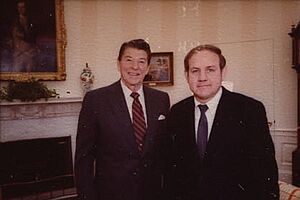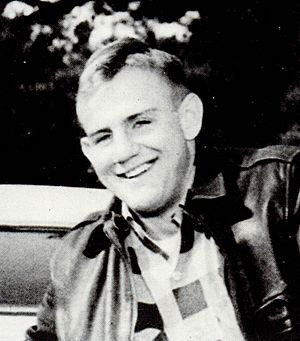Fob James facts for kids
Quick facts for kids
Fob James
|
|
|---|---|
 |
|
| 48th Governor of Alabama | |
| In office January 16, 1995 – January 18, 1999 |
|
| Lieutenant | Don Siegelman |
| Preceded by | Jim Folsom Jr. |
| Succeeded by | Don Siegelman |
| In office January 15, 1979 – January 17, 1983 |
|
| Lieutenant | George McMillan |
| Preceded by | George Wallace |
| Succeeded by | George Wallace |
| Personal details | |
| Born |
Forrest Hood James Jr.
September 15, 1934 Lanett, Alabama, U.S. |
| Political party | Republican (early 1970s–1978, 1994–present) |
| Other political affiliations |
Democratic (before early 1970s, 1978–1994) |
| Spouse | Bobbie Mooney |
| Children | 4, including Tim James |
| Profession | Politician, football player, civil engineer |
| Military service | |
| Allegiance | United States |
| Branch/service | US Army |
| Years of service | 1956–1958 |
| Rank | Second lieutenant |
| Unit | Corps of Engineers |
Forrest Hood "Fob" James Jr. (born September 15, 1934) is an American politician, civil engineer, and former football player. He served as the 48th governor of Alabama two separate times. What makes his career unusual is that he was first elected as a Democrat (1979–1983) and later as a Republican (1995–1999).
Contents
Early Life and Career
From Football Star to Businessman
Fob James was born in Lanett, Alabama. As a young man, he was a talented football player. After graduating from the Baylor School in Tennessee, he went to Auburn University. There, he played as a halfback and was named an All-American player in 1955.
After college, James earned a degree in civil engineering. He briefly played professional football for the Montreal Alouettes in Canada. He then served for two years in the U.S. Army as a lieutenant in the Corps of Engineers.
In 1961, James had an idea to make plastic-coated barbells for exercise. He started a company called Diversified Products (DP) in his basement. The company became very successful, making fitness equipment and employing 1,500 people. James ran the company until 1977.
Family and Community Work
James's son, Gregory, was diagnosed with cystic fibrosis, a serious illness. Sadly, Gregory passed away at the age of eight. To honor his son, James helped create the Gregory Fleming James Cystic Fibrosis Research Center at the University of Alabama at Birmingham in 1981.
Before becoming governor, James was also involved in improving Alabama's roads. He led a group that created a 20-year plan for the state's highways, which the government later approved.
Political Career
First Term as Governor (1979–1983)

In 1978, James ran for governor as a Democrat and won. During his first term, he focused on several key areas. He worked to improve public schools, mental health services, and the state's Medicaid system. To save money, he combined some government agencies and cut spending.
One of his most important achievements was making Alabama's government more inclusive. He appointed Oscar W. Adams Jr. as the first African American to serve on the Alabama Supreme Court. He also appointed other African Americans to major government positions.
During this time, James signed a law that allowed teachers to lead willing students in prayer. This law was later challenged and found to be unconstitutional by the U.S. Supreme Court in 1985.
Years Between Terms
James did not run for re-election in 1982. He tried to run for governor again in 1986 and 1990 as a Democrat but was not successful. During this time, he focused on his businesses.
In 1994, James decided to run for governor again, but this time he switched to the Republican Party. He won the election by a small margin and began his second term.
Second Term as Governor (1995–1999)
As a Republican governor, James governed as a strong conservative. He believed in states' rights, which is the idea that states should have more power to make their own decisions without interference from the federal government.
Justice and Prisons
James took a tough stance on crime. His administration brought back the use of "chain gangs," where prisoners were chained together to perform labor outside the prison. This practice was very controversial and was seen by many as an outdated and harsh punishment. The practice was ended in 1996 after a lawsuit.
James was a firm supporter of the death penalty. However, in one of his last acts as governor, he changed the death sentence of Judith Ann Neelley to life in prison. He said he did this because the judge had overruled the jury's recommendation for a life sentence.
Education and Religion
In his second term, James continued to focus on education. He passed a law that required local school districts to raise property taxes to better fund their schools. He also increased the number of academic classes high school students needed to graduate.
James often expressed his religious beliefs in his role as governor. He supported adding a warning sticker to science textbooks that stated evolution is a "theory, not fact."
He also got involved in a major controversy over a judge named Roy Moore. Judge Moore had placed a wooden plaque of the Ten Commandments in his courtroom. A court ordered the plaque to be removed, saying it violated the separation of church and state. James supported Judge Moore and even threatened to use the National Guard to prevent the plaque's removal.
Later Life
James ran for a third term in 1998 but lost the election to Don Siegelman. After leaving office, he returned to private life to spend more time with his family.
He and his wife, Bobbie, have four children. Their son, Tim, has also run for governor of Alabama. As of 2021, Fob James lives in Florida.
 | Toni Morrison |
 | Barack Obama |
 | Martin Luther King Jr. |
 | Ralph Bunche |


